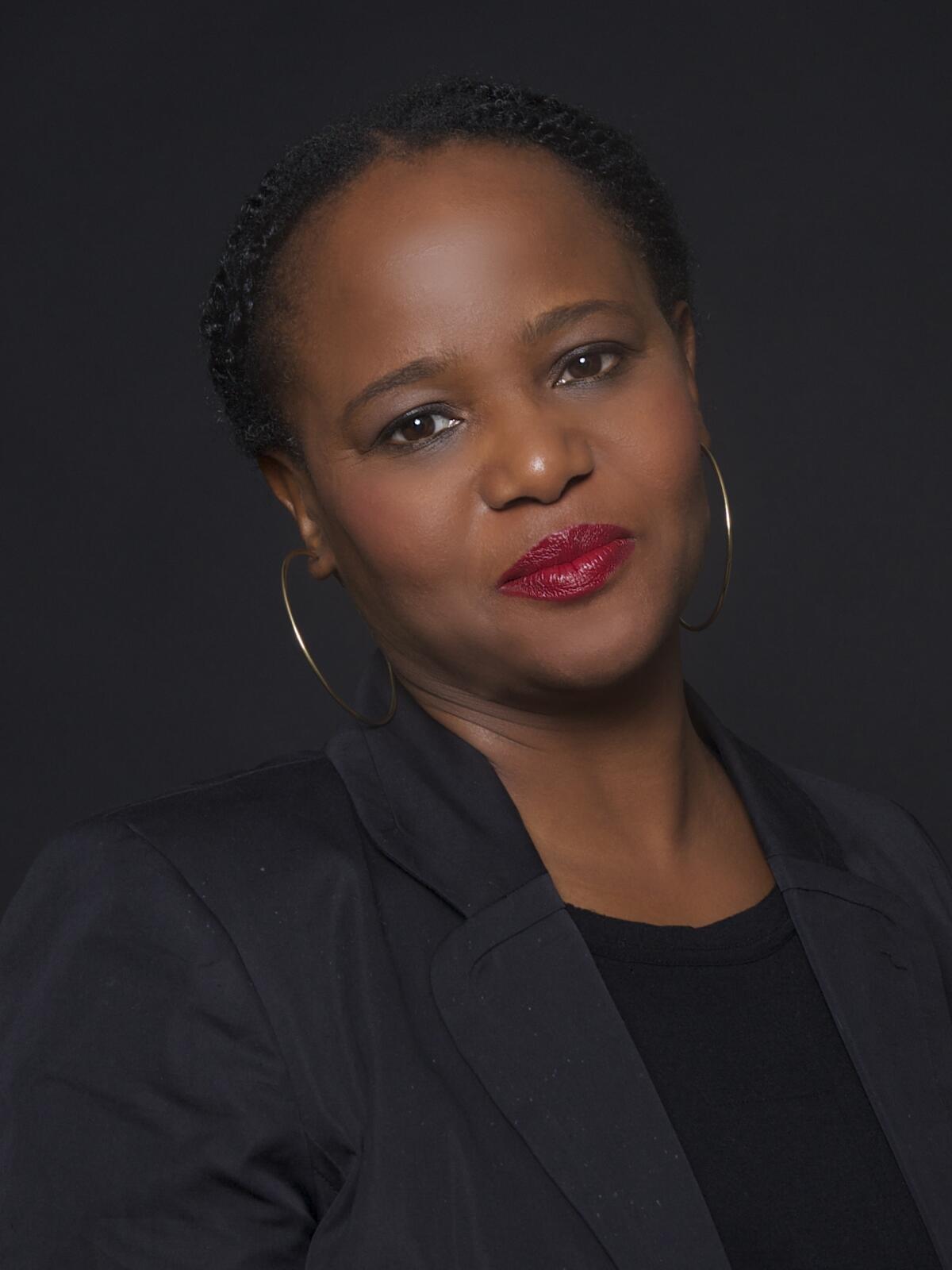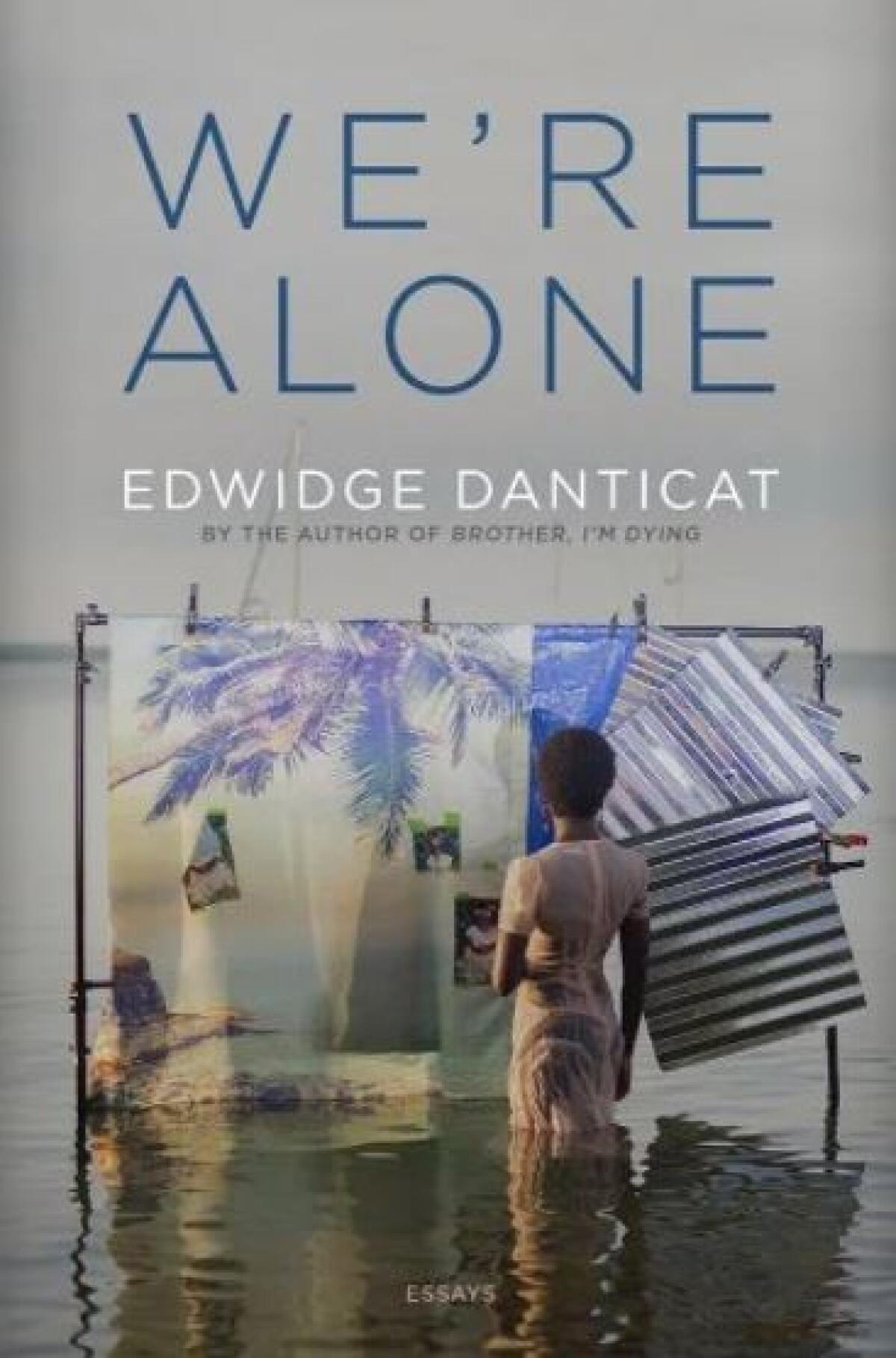Turning to essays, Edwidge Danticat makes shrewd use of the form

- Share via
Book Review
We're Alone: Essays
By Edwidge Danticat
Graywolf: 192 pages, $26
If you buy books linked on our site, The Times may earn a commission from Bookshop.org, whose fees support independent bookstores.
Essay collections appear infrequently on the lists of most popular nonfiction — memoirs and historical narratives dominate conversations about the genre. Those forms of nonfiction are wonderful in their own ways. They are also the versions that are closest to fiction. That’s not necessarily a bad thing, but it can exclude the unique offerings of the essay.
For the record:
10:30 a.m. Sept. 3, 2024A previous version of this piece misspelled author Erica Cardwell’s name as Caldwell.

An essay collection presents a compressed reading experience, sometimes poetic, and often requiring the author to demonstrate the act of forming an opinion. In its most exalted form, the essay collection is about many things at once. Its goal is not to share information about a topic but to dramatize the formation of a perspective, the development of an informed point of view — a focus that makes the form much more dependent on the writer than the subject matter. “We’re Alone,” a collection of eight short essays by the celebrated Haitian American novelist and short story writer Edwidge Danticat, exemplifies that achievement.
Readers who have appreciated other voice-driven essay collections, such as Zadie Smith’s pandemic-inspired “Intimations,” Erica Cardwell’s “Wrong Is Not My Name,” Jordan Kisner’s “Thin Places,” Cathy Park Hong’s “Minor Feelings” or Elissa Gabbert’s “The Unreality of Memory,” will find something familiar with Danticat in “We’re Alone.” The thematic thread of this collection binds loosely around experiences of disconnection or isolation that are exacerbated by a sense of risk predicated on racial, political or social vulnerability. In the essay “A Rainbow in the Sky,” Danticat writes: “The less stable your house, the more terror you feel.” She has elegantly captured that those who face a storm with all foundations intact have a different relationship to the experience than those who were already struggling before it.
In the preface to the book, Danticat discloses that writing essays allows her to feel alone with herself and present with a reader. These pieces represent her outstretched hand, an invitation to spend shared time in reflection. Danticat took the book’s title from the French poem “Plage” by the Haitian writer Roland Chassagne, whose tragic history of imprisonment is also explored in the book. His poem envisions a night spent under palm trees, and the longing for the end of a deep disappointment. Here Danticat finds an early foothold into one of the book’s chief concerns: thresholds where someone’s feelings have been constricted for the sake of other people’s comfort. The title also invokes a plural self, a collective that shares in the writer’s experience of solitude and disaffection.
In the literary essay, a tradition that unites personal insight with anecdotes, evidence and reasoning, one of the most satisfying moments is finding where the writer’s logic breaks and she struggles to fully accommodate the proportions of her subject. Such moments make the inquiries appear vulnerable and honest, even when in reality they are simulations of sense-making. Not all essayists are invested in showing their struggle in understanding or are given the space to do so. But Danticat invites readers into the challenge of putting facts and feelings together. She excels at showing how hard it is to know what the right questions are to ask or how to answer them, and like many of us, she struggles to talk about difficult subjects, especially with her children.
For example, in “By the Time You Read This…,” Danticat debates how much and when to tell her children about how police violence affects the way Black people and immigrants think about safety. She writes, “Each time a young Black person is killed by a police officer or by a vigilante civilian, I ask myself if the time had come for me to write to my daughters a letter about Abner Louima and the long list of nonsurvivors who have come after him.” There is dignity in her doubt, which makes way for the kind of compassion that characterizes these essays.
Danticat’s insights are informed by accounts of the trials of friends and family: Her beloved mother wanders off in an airport; an uncle suffers from an irresolvable, progressive disorientation; Louima, a family friend, is attacked and raped by police; and two mentors, Toni Morrison and Paule Marshall, live through their final months. These experiences emphasize the possibility of loss and disconnection, reflecting a kind of hypervigilance that can be an inheritance of trauma. She approaches these accounts with the courage of an intentional witness, maintaining that perspective even when she looks beyond her own circle. In “Chronicles of a Death Foretold,” Danticat tells the story of a self-proclaimed prophetess who predicted the 2021 assassination of the Haitian President Jovenel Moïse, and the collection’s penultimate essay, “Wozo, Not Mawozo,” examines the weeks following the kidnapping of Christian missionaries in Haiti in 2021.
These are clearly the essays of an accomplished novelist. They move swiftly through detailed anecdotes and varied landscapes, even when the principal action the speaker engages in is “thinking.” There is room in an essay for dramatic action, for the expression of the body as it relates to thought, which was somewhat lacking here. At times, I struggled to see the author as a figure in the dramatic action she cited. Even so, it’s a testament to Danticat’s skill that these brief, intense works about serious matters do not feel heavy. She brings us close enough to the trouble at hand that we cannot mistake what we have seen.
But we are not alone in trying to make sense of feelings that come from becoming a witness to this world. No one is.
Wendy S. Walters is the author of the prose collection “Multiply/Divide” and an associate professor of nonfiction at Columbia University.
More to Read
A cure for the common opinion
Get thought-provoking perspectives with our weekly newsletter.
You may occasionally receive promotional content from the Los Angeles Times.










